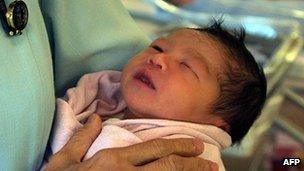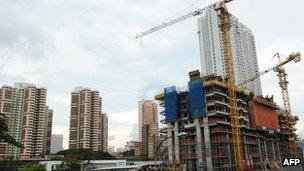Singapore uses rap to try to boost birth rate
- Published
Watch: Singapore's birth-rate is low enough to spark a nationwide campaign to encourage baby making - and it is disrupting the property market for one. Sharanjit Leyl reports.
"Singapore's population, it needs some increasing."
"I'm a patriotic husband, you're my patriotic wife, let's do our civic duty and manufacture life!"
Those may seem like unlikely lines to advertise a brand of breath mints, but in spite of that - or perhaps because of it - the video went viral in Singapore on YouTube, external earlier this year.
The lines are part of a rap that uses local references such as "Let's put a bao (or bun) in your oven" to try to poke fun at Singapore's declining birth rate.
The advertising firm behind it, BBH, hoped that by focusing the advert on a serious problem, it could draw attention to the issue in a fun way.
Creative director Douglas Hamilton says they wanted to use the power of music to get people to do "their national duty".
"This was purely an online thing, so we had to make it fun and funny. It is the biggest issue in this country. We are the worst in the world at reproducing ourselves, so we felt like this was an issue we had to tackle."
"We knew that the government had tried many things, whether it be launching perfumes with pheromones in them or trying speed-dating nights, and many of these things may have been creative but didn't necessarily work. So we thought, why don't we do the most creative thing we can to fix this problem, which is come up with a rap song?"
Scary statistics
Taking it far less lightly though is Singapore's government. It spends $1.3bn (£810m) a year on policies to encourage citizens to have more children.

Singaporeans blame career, stress and the cost of properties and education for not having children
The government's marriage and parenthood package has doled out as much $15,000 for each child, extended maternity leave and handed out tax breaks. But all of these have had little effect.
Singapore's birth rate according to its National Population and Talent Division, external currently stands at 1.2 per woman. The last time it was above the replacement rate of two was in 1976.
So why aren't Singaporeans having kids? Tan Wei Ming, a director of Marriage and Parenthood Policy at the National Population & Talent Division, says it's due to "better education" and "a wider range of career opportunities".
"These have allowed individuals to have a broader range of options in terms of life goals and priorities, in addition to getting married and starting families," she says.
"Such changes in societal norms have contributed to rising singlehood, later marriages and births, resulting in a decline in birth rates in Singapore."
Meanwhile, a policy of aggressively pursuing immigration to address the shrinking population has created resentment among locals. Singapore websites are filled with barely disguised xenophobia towards many new immigrants, particularly those from mainland China, who are criticised for keeping wages low and not fitting in.
The rise in immigration is also seen as one reason why last year Singapore's governing party experienced its worst election result since independence. Since the elections, there has been an attempt to redress the issue, with quotas and higher levies placed on the number of foreign workers.
Unexpected consequences
While a plunging birth rate has widely documented effects on a nation's economic growth, tax revenues, healthcare costs and immigration policies, Singapore's example is also having some unexpected consequences. It has started to affect the property sector.

The government is trying to discourage the building of very small apartments
The country's Urban Redevelopment Authority has moved to curb the number of "shoebox" apartments that are allowed to be built in certain areas of the city.
These apartments have floor areas of 500 sq ft (46 sq m) or less and have proven very successful with developers. But there have been concerns that they may promote a single lifestyle and discourage developers from building larger family-friendly homes.
One developer that has done well from them has been EL Developments. Managing director Lim Yew Soon says that its "shoebox" apartment offerings often sell much quicker than their larger units.
"They are more popular... in the sense that the units can be rapidly sold out in days if not weeks, compared to the larger size units, which developers may have to hold until completion. This makes it much better for our cashflow."
But he admits that the new rules do give clearer guidelines to developers who would previously get their plans turned down if they offered too many small units in one project.
'Too stressed'
While these new rules may seem like steps towards increasing the national birth rate, conversations with Singaporeans working in the downtown financial district suggests they may have little effect.
"People are too stressed, homes are expensive and so is education, so many people are putting it off," says one young executive.
"Other people can have the kids. For me, it's important to have my own money and my own time," says another young woman in her 20s.
People blamed career, stress and the cost of properties and education as factors preventing them from having children.
So, as much as the government tries to push its citizens to have kids, when it comes to making babies, it's Singaporeans who get the last word.